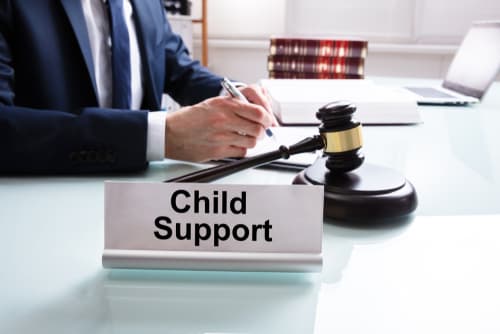Illinois Child Support Laws
Breaking up can be hard to do, but it is often even more complicated when children are involved. Whether you are married to your child’s parent or not, there are common legal issues to be sorted out in these situations, including parenting allocation and child support. Matters like parenting allocation and child support are governed by Illinois family law.

Per Illinois child support laws, both parents have a legal obligation to financially support their children. This is achieved through child support, or payments made from one parent to the other following a divorce or break up of a relationship. In Illinois, child support calculations are based on the parents’ incomes.
Under Illinois child support laws, paying child support is not optional. However, it is important to ensure that you are paying -- or receiving -- the proper amount of child support. An Illinois child support lawyer can help you with that process.
What is Child Support?
Child support is the amount of money that one parent is required to pay another parent to support their minor child. In most situations, the parent who does not have the primary parenting allocation must pay child support to the primary parent.
Illinois child support laws mandate financial support for all of a child’s basic needs, such as food, clothing, housing, and medical care. It may also include expenses for any activities that the child engages in, daycare, private school tuition, school supplies, or even toys. In essence, the non-primary parent pays child support to the primary parent to account for their share of the cost of raising their child or children.
The obligation to pay child support typically ends when a child turns 18, or 19 if the child is still in high school. Alternatively, child support payments may end when a child becomes emancipated by getting married, joining the military, or no longer requires their parents’ support. However, a judge may order child support to continue beyond the age of 19 for a child who is disabled and cannot support themselves, or for college expenses.
The right to receive child support belongs to the child, not the parents. For this reason, any agreement regarding child support must meet the guidelines set by Illinois child support laws and must be approved by the court.
How Is Child Support Calculated in Illinois?
Until 2017, child support calculations in Illinois were primarily based on the non-primary parent’s net income. Net income would be calculated by subtracting certain expenses from their gross income. From there, a percentage was applied based on their net income and the number of children involved.
In July 2017, a new law came into effect that takes both parents’ income into consideration when calculating child support. This is known as the income shares model. The purpose of this change to the law is to reflect that both parents are responsible for their share of raising their children.
Under this law, a court calculates child support obligations by:
- Determining each parent’s monthly net income;
- Adding the parents’ monthly net incomes together to determine the combined monthly net income of the parents;
- Selecting the appropriate amount from the schedule of basic child support obligations based on their combined monthly net income and the number of children; and
- Calculating each parent’s percentage share of the basic child support obligation.
Although obligations under Illinois child support laws are calculated individually for each parent, the parent with primary parenting allocation -- or the majority of parenting time -- does not pay support to the other parent. Parenting time is based in part on the number of overnight stays the child has with each parent annually. Instead, there is a presumption that this money is spent directly on the child. The other parent (the obligor) pays child support to the receiving parent.
There are some situations where a court may deviate from this model. Specifically, because parenting allocation and support determinations are based on the best interest of the child, there may be cases where the obligor is required to pay a higher or lower amount. For example, if a child has special needs, then it may warrant a higher child support order.
There are other reasons why a court may make adjustments to the child support amount. This includes:
- The child’s probable standard of living if the parents had stayed together;
- The child’s educational needs;
- The financial resources and needs of the child and both parents;
- The child’s physical and emotional condition.
As an example, a parent who makes a very high income may be ordered to pay more than the amount set forth in the Illinois child support guidelines, while a parent with a very low income may not have to pay as much.
How Is Net Income Calculated?
One of the most important factors in determining child support in Illinois is each parent’s net income. Net income is determined by subtracting certain expenses from a parent’s gross income, which includes income from all sources (with limited exceptions).
A parent can deduct specific items from their gross income to arrive at their net income, including:
- Federal and state income taxes
- Social security tax
- Required retirement contributions
- Health insurance premiums for the children and the non-primary parent
- Any expenses that are necessary to produce income
- Necessary medical expenses
- Reasonable amounts that have already been paid to benefit the child or the primary parent (other than gifts)
Once each parent’s net income is determined, then the two numbers are added together to find their combined “adjusted net income” using the child support guidelines. Then the income conversion chart can be used to find the basic support obligation for each parent.
This chart is updated each year to take a variety of factors into account, such as inflation. Looking at the Income Conversion Chart, you can see how the child support obligations are determined based on combined net incomes and the number of children.
For example, for two parents that make a combined net income of $7,475 to $7,524.99 per month, the child support obligation is $1,201 per month for 1 child, $1,808 per month for 2 children, and $2,156 per month for 3 children.
This basic child support obligation number is then multiplied by each parent’s percentage share of adjusted net income. This percentage is determined by dividing each parent’s adjusted net income by their combined adjusted net income.
For example, if their combined net income is $10,000 a month, with Parent A contributing $3,000 and Parent B contributing $7,000, then Parent A’s percentage share is 30%, while Parent B’s percentage share is 70%. By taking this number into account, the child support obligation more accurately reflects the amount of income earned by each parent to help ensure that the child’s living standard remains consistent in both homes.
If parents split parenting time, which occurs when the child has 146 overnight stays per year with each parent, then the basic child support obligation is multiplied by 1.5. In this way, the amount of time that each parent spends with their child will factor into the child support calculations.
The Illinois Department of Healthcare and Family Services, Division of Child Support Services (DCSS) offers a worksheet that can be used to help you figure out your child support obligations. You can also use the DCSS child support calculator to estimate your child support obligations. This tool asks a number of questions to help you figure out how much you may be required to pay -- or will receive -- in child support each month.
How a Child Support Lawyer Can Help
For some parents, child support determinations are relatively straightforward: you add up income, subtract expenses, and use the child support estimator to figure out support obligations. An Illinois child support attorney can help you with child support calculations, and formalize a child support agreement for the court that complies with Illinois law.
However, there are a number of situations under Illinois child support law where child support calculations are not so easy. Your attorney will use their knowledge of the law to advocate for your right to pay or receive child support.
For example, if your ex is voluntarily unemployed or underemployed, your lawyer may ask the judge to impute income to them. In other words, if your ex is purposefully avoiding making money so they don’t have to pay child support, the court will examine why they aren’t earning money (or earning much money). If the other parent doesn’t show that they are seriously job hunting or unable to work due to a disability, the judge might base their child support obligations on imputed or potential income.
In cases where there has been a change of circumstances, you may also seek to have a child support order modified or terminated. For example, if your child is diagnosed with a medical condition that requires you to quit your job to care for them or incur substantial out-of-pocket expenses, that might be a basis to have the child support order modified. Alternatively, if one parent begins to make a lot more or less money, leading to a difference of at least 20% in child support using the guidelines, it may warrant a modification of the order.
Questions about Illinois Child Support Laws? Reach Out Today.

Whether you just recently separated from your child’s parent, or have been dealing with a divorce or separation for some time, it is necessary to understand Illinois child support laws and calculate child support obligations as soon as possible. This money is meant to make sure that your kids are cared for, so it is important to get it right. We can help.
At Manassa Law, P.C, our Barrington child support attorneys help individuals and families throughout Cook County, McHenry County, and Lake County with their family law matters. We have significant experience and work tirelessly to help our neighbors achieve the best possible outcome in their Illinois child support case.
To learn more, or to schedule a consultation with an Illinois family and child support lawyer, reach out to our Barrington office today at 847-221-5511, or fill out our contact form at Manassa Law, P.C. online.
Manassa Law - Barrington Office
1000 Hart Rd 3rd Floor
Barrington, IL 60010
P: (847) 996-9177
